Schisandra Berries: Benefits for Health
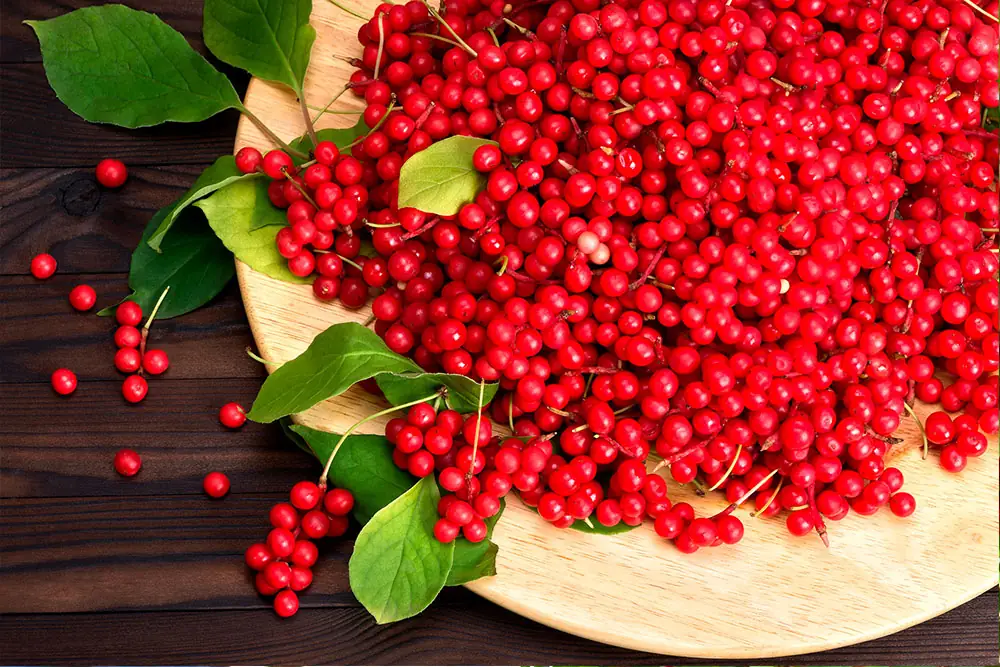
Native to China and known to traditional medicine for thousands of years, Schisandra chinensis (often called simply Schisandra) is a vine that bears little red berries that are good for your health. What schisandra benefits are confirmed by modern science? How to choose quality schisandra dietary supplements? What are the potential side effects of using this remedy?
Read on, and you will find the answers to all these and numerous other questions.
Schisandra Chinensis: Benefits and Constituents

Berries (or, botanically speaking, fruits) of this plant are extremely rich in bioactive compounds like:
- Lignans (as many as 30 types of these compounds, including schisandrins A and B). It is lignans that ensure the pro-health activity of Schisandra fruits.
- Triterpenoids (demonstrate antimicrobial, antiviral, and antiallergic activity).
- Flavonoids. These natural antioxidants scavenge free radicals and protect cells.
- Essential oils.
It is important to say that the lignan content of the berries greatly depends on the type of soil, humidity, harvest time, and numerous other factors. For this reason, the biological activity of non-standardized schisandra teas and supplements can differ noticeably.
Use in Traditional Chinese Medicine
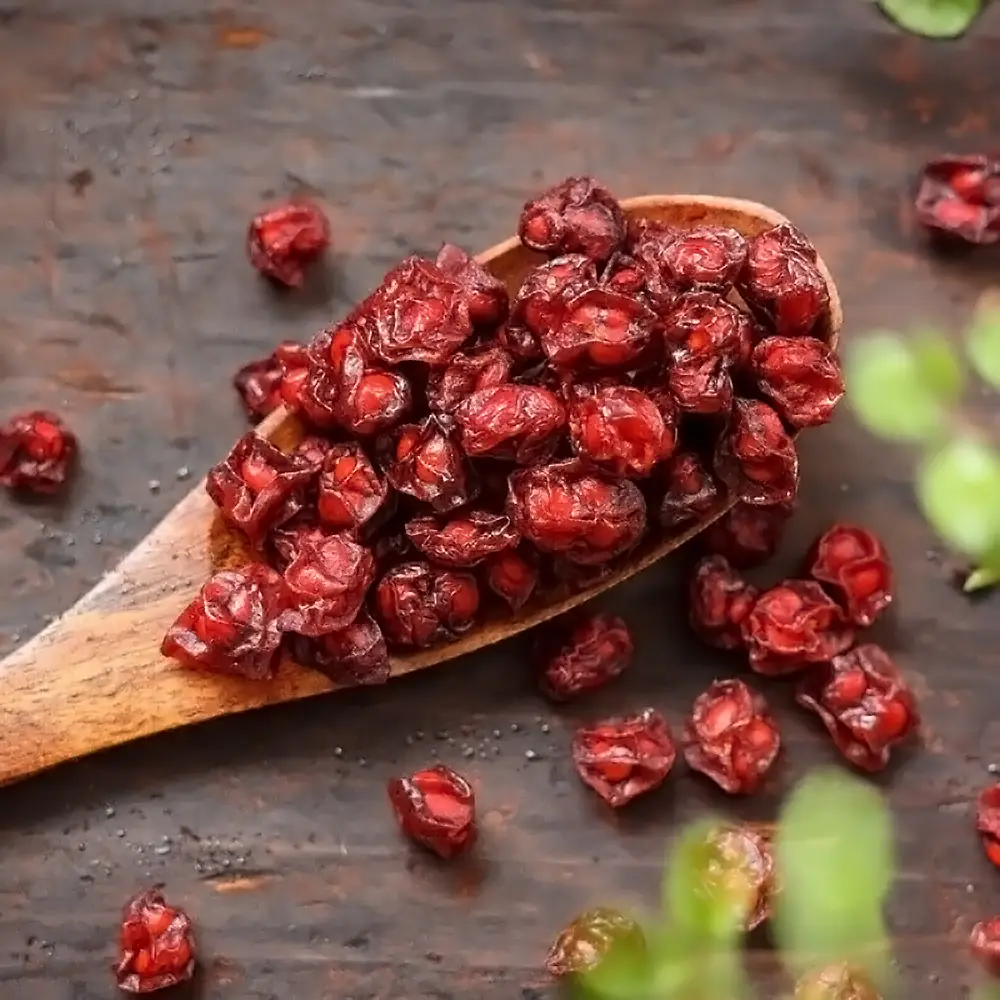
Traditional medicine of China and Russia has been using this remedy to treat:
- insomnia
- fatigue
- respiratory infections
- diseases of the gastrointestinal tract
- mental health issues.
Modern evidence-based medicine has only begun to investigate the health benefits of this plant. Here are the results of recent scientific research.
Antimicrobial Compounds
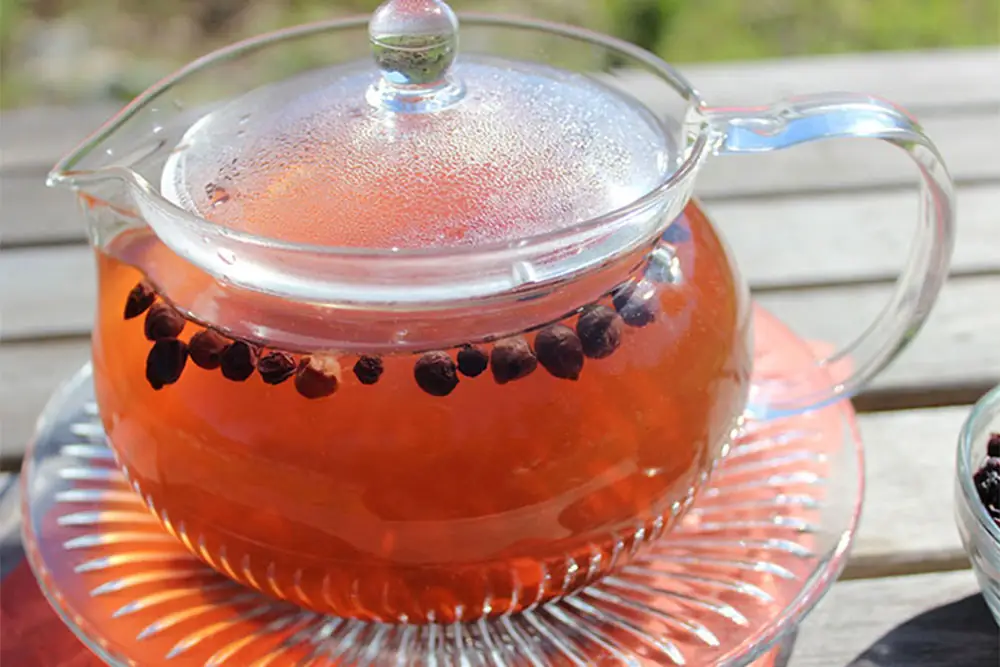
Numerous studies conclusively prove that essential oils and lignans found in Schisandra berries have a pronounced antibacterial effect. For this reason, Schisandra berry tea offers benefits for sore throat and seasonal respiratory illnesses.
Anti-Cancer Effect
Both older and newer studies demonstrate that lignans can be effective in inhibiting the development of cancer cells. Unfortunately, even though this remedy looks very promising, additional wide-scale research on humans is required.
Adaptogenic Properties
While Schisandra is widely believed to be an adaptogen (a remedy that helps your body cope with stress), there are surprisingly few studies of its adaptogenic properties either on humans or on animals.
In 2014 studies on mice, schizandra and gomisin N (lignans found in schisandra) improved the quality of sleep and had a mild sedative effect. A 2018 animal study of the properties of schisandrin B (another lignan) achieved similar results.
Benefits of Schisandra Berries for Cognition
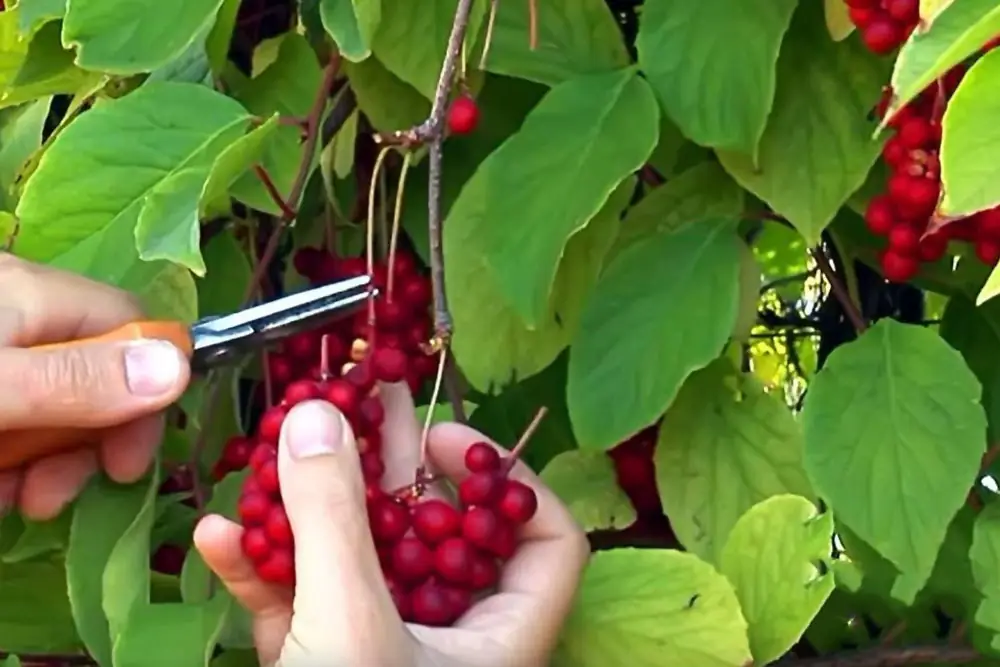
There is also a promising hypothesis that schisandra fruit extract offers benefits for cognition and age-related mental disorders.
In an older 2013 study, mice who were given an extract of schisandra fruits, demonstrated better memory.
A 2015 study on mice found schisandra extract effective in preventing the onset of Parkinson’s disease.
In a 2016 study schisandra extract reduced cognition deficits in rats.
A 2017 test-tube study demonstrated that schisandrin B, one of the lignans found in schisandra, is effective in preventing a build-up of amyloid beta peptides in the brain, which is one of the factors in the development of Alzheimer’s disease.
A recent 2018 review lists numerous studies on animals where the use of schisandra extracts led to noticeable improvements in cognitive function and protected brain cells from damage. The authors conclude that further research on humans might help develop effective neuroprotective medications based on schisandra.
Lastly, recent test-tube studies demonstrate that schisandra contains numerous bioactive compounds that can reduce the damage to brain cells caused by Alzheimer’s disease.
That said, additional studies on humans are still required.
Schisandra Herb: Benefits for Muscle Strength and Fatigue
In a 2018 study, old mice were given schisandra extract. They demonstrated better muscle growth after swimming compared to the control group.
In a 2020 study, post-menopausal women took 1000 mg of schisandra extract per day for 12 weeks. Their muscle strength markedly increased compared to the control group. What’s more, women who used plant extract also had significantly lower lactate levels (indicators of muscle fatigue) at rest. No adverse side effects were observed.
In 2021 there was another placebo-controlled study of the effect of schisandra on muscle strength and exercise performance. 27 older adults took plant extract (1000 mg) for 12 weeks. Their knee muscle strength and endurance noticeably increased. However, no changes in muscle mass were found. Schisandra was well-tolerated by all participants.
A 2021 review of bioactive compounds found in schisandra, makes a conclusion that this plant can improve fatigue and have a positive effect on steroid receptors.
Schisandra: Benefits for Weight Loss and Diabetes
There is anecdotal evidence that this berry can reduce appetite and help with weight loss. A 2012 study on obese rats demonstrated that animals who were given schisandra lost excess weight caused by a high-fat diet. Unfortunately, there is still no scientific evidence that this remedy can help overweight humans.
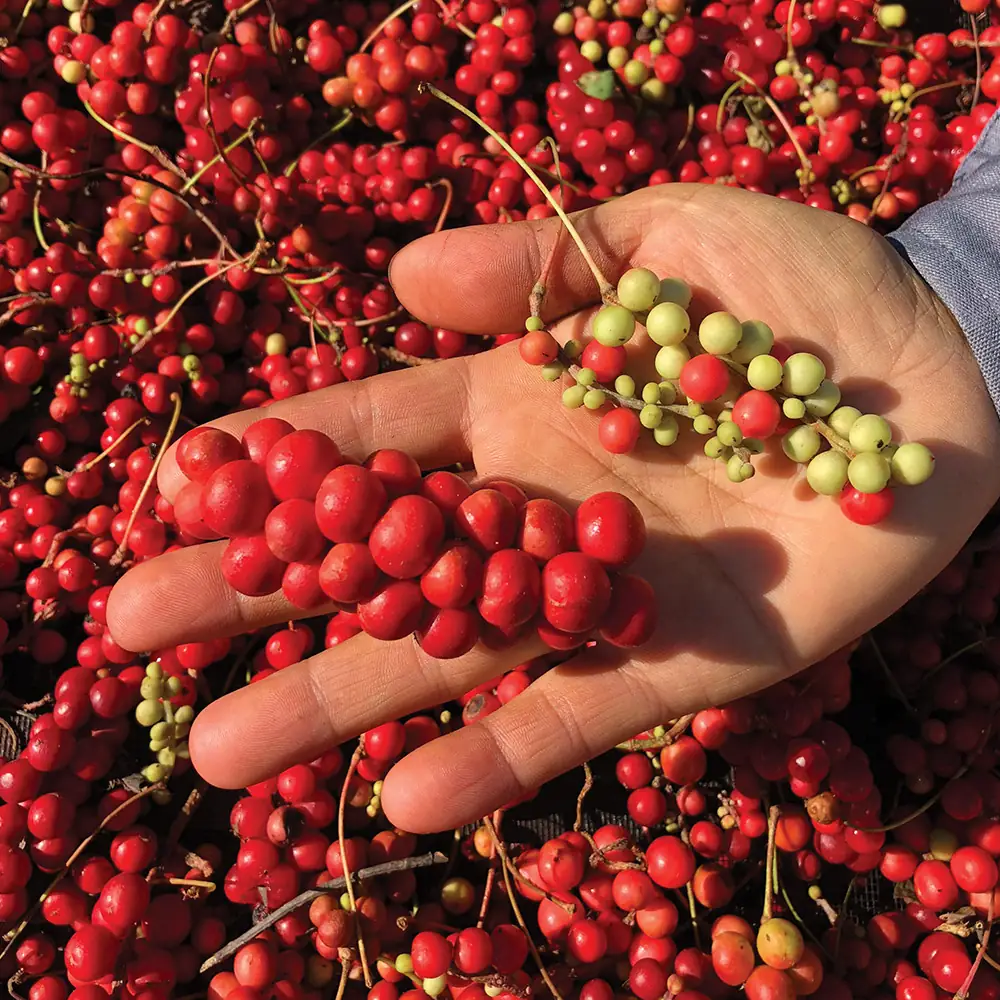
Still, as schisandra teas and supplements are safe and not expensive, you can give them a try if you want to shed pounds. It is important, though, that you do not neglect to do physical exercise and have a balanced diet.
Test-tube studies also demonstrate that schisandra can help reduce blood glucose levels and improve fatty acids metabolism, which might be important for people with diabetes. Still, further research is required.
Schisandra Berry: Benefits for Skin and Hair
There are two 2011 test-tube studies that demonstrate that lignans have a protective effect on human and rat skin and prevent oxidative injury caused by direct solar rays. Still, it is not reliably known whether schisandra supplements protect skin from so-called photoaging: additional human studies are required.
In a 2009 study on animals, Schisandra nigra (a plant variety that belongs to the same family as Schisandra chinensis) was used to improve hair growth in rats. However, no similar studies on humans were carried out.
Effects on Aging
There are several studies on animals that suggest that schisandra may delay aging. Unfortunately, these results do not automatically mean that this remedy will also be effective in delaying aging in humans.
Some researchers hypothesize that these berries might boost the synthesis of glutathione (important for detoxication ) and nitric oxide (helps reduce blood pressure), which may help increase longevity. Additional studies are needed to confirm or refute these theories.
Schisandra Berry: Health Benefits for the Liver
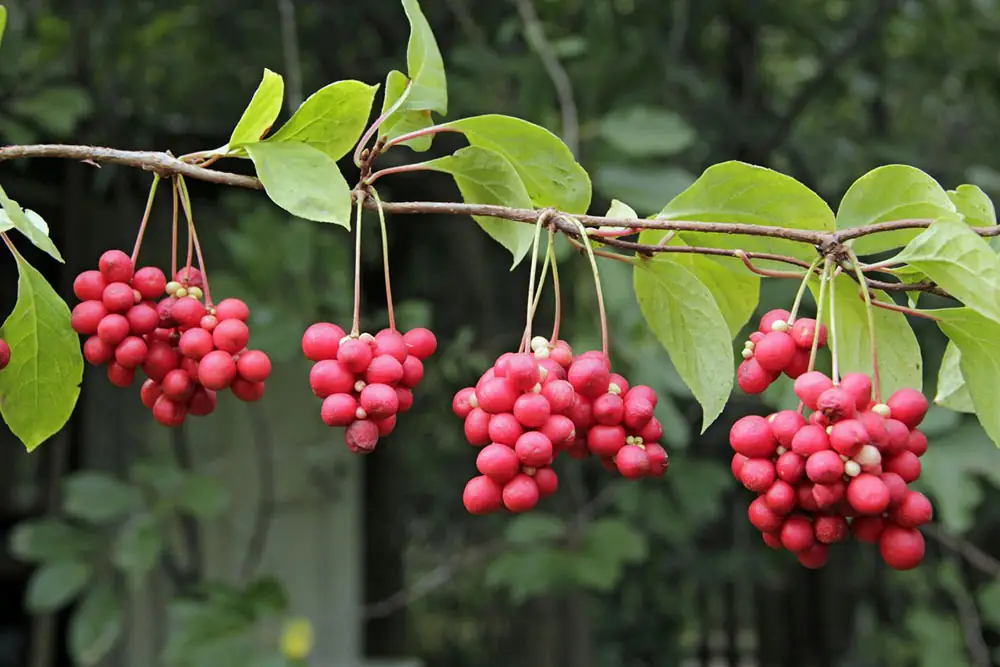
This plant is believed to improve liver function in a number of ways.
First, schisandrins were demonstrated to protect the liver against oxidative damage. In a 2013 study on mice, pollen of schisandra was successfully used to reduce acute liver damage: this hepatoprotective effect was attributed to antioxidant properties of the plant. In a 2015 test-tube study, schisandra lignans protected liver cells from hepatotoxic medications.
Second, schisandrins (in combination with other bioactive compounds) can improve insulin resistance in liver tissues.
Third, as shown in a 2015 study on mice, the pulp of schisandra berries can augment the action of fenofibrate, a medication for hyperlipidemia. Hyperlipidemia, or excessive accumulation of fats in the liver, is one of the main factors of non-alcoholic fatty liver disease.
A recent 2021 review of animal studies concludes that numerous bioactive compounds found in schisandra have anti-inflammatory properties and can be used in the treatment of the liver injury.
It needs to be said, however, that so far, hepatoprotective properties of schisandra were studied only in test-tube and on animals. More wide-scale human studies are needed.
Then again, schisandra is well-tolerated and causes few (if any) side effects. If you have any liver issues, discuss with your doctor whether you might use this medicinal herb as a supplementary therapy.
Schisandra: Benefits for a Woman
In a 2016 study, 18 women with menopausal symptoms were given schisandra extract for 6 weeks. They reported significant improvements in such symptoms as hot flushes, heart palpitations, and sweating compared to the placebo group.
No adverse effects were reported. Researchers conclude that schisandra is a safe and effective complementary remedy for menopausal symptoms.
Although additional wider-scale studies are still needed, if you experience unpleasant symptoms of menopause, schisandra is worth trying.
Benefits for Depression
There are two 2016 studies that show that schisandra improved symptoms of depression in mice. Very high doses of plant extract (600 milligrams per kilogram of weight) were used.
Unfortunately, schisandra and its possible impact on depression have not been researched in humans. If you suffer from depression, seek professional advice from an experienced healthcare practitioner.
Schisandra: Benefits for Thyroid Hormones
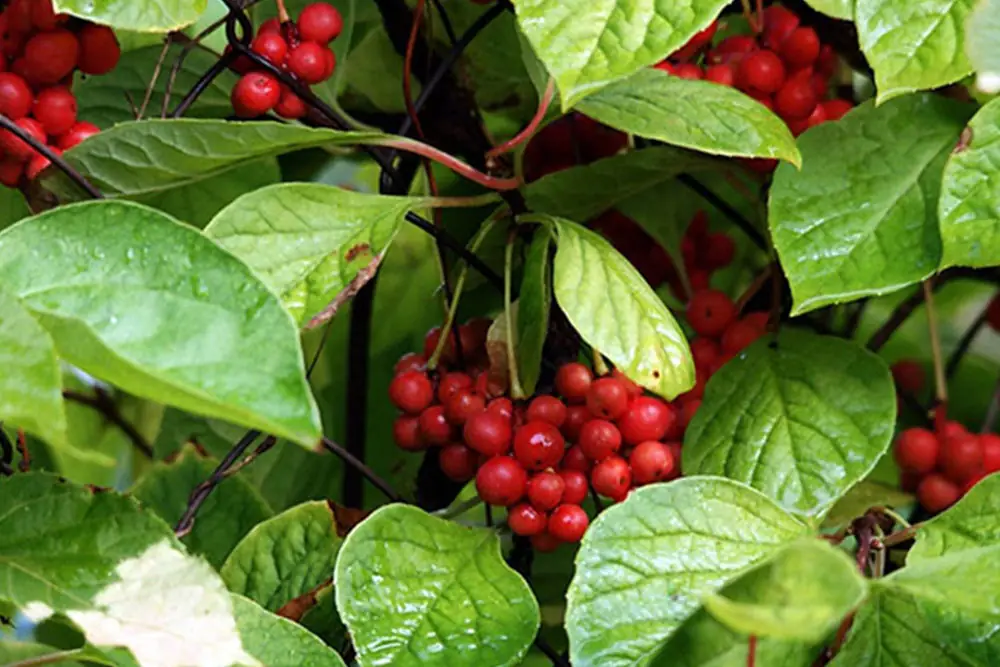
Ashwagandha, a popular adaptogen, is known to activate thyroid function, which might be important for people with low levels of thyroid hormones. While schisandra also demonstrates adaptogenic properties, so far there are no scientific studies that would confirm that it influences the health of the thyroid gland.
What’s more, if you have any issues with your thyroid, do not use any supplements and remedies that might improve its function without consulting with an experienced health practitioner first.
Schisandra: Benefits for Men
Ashwagandha has also proven to increase levels of testosterone in men, boost libido, and improve sperm quality. Unfortunately, there are no high-quality studies that would confirm that schisandra has similar properties. So, if you and your partner plan to have a baby or you want to enjoy an active sex life, use ashwagandha, not schisandra.
Benefits for Kidneys and Respiratory System
Lastly, in a 2020 review a hypothesis is made that schisandra can alleviate the symptoms of asthma. A similar 2023 review hypothesizes that this remedy can help prevent the development of nephropathy, one of the most common complications of diabetes.
Additional research is needed to confirm either of these hypotheses.
Potential Side Effects of Schisandra
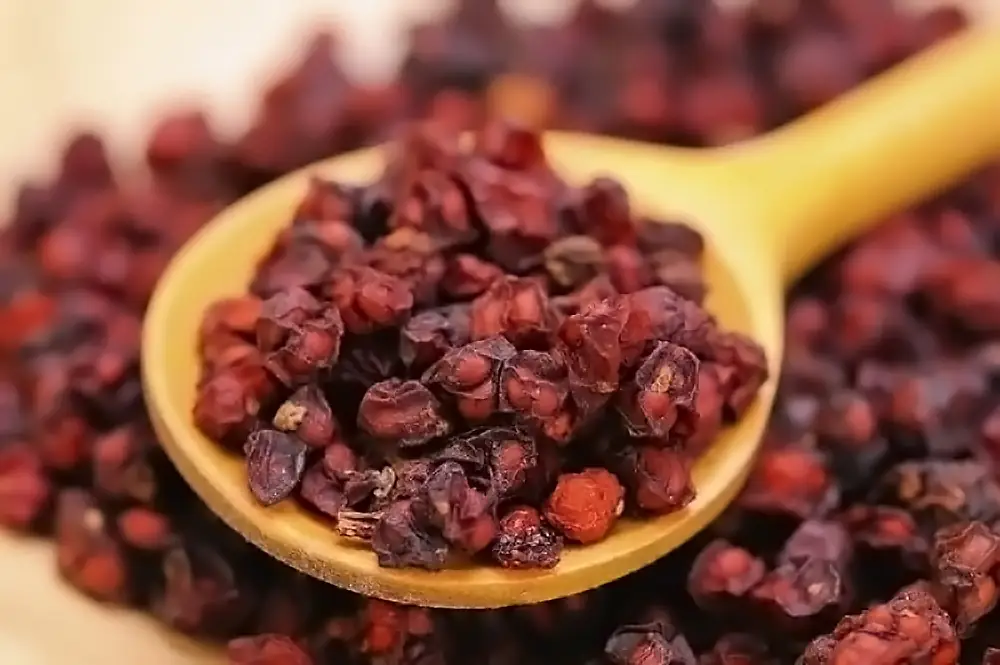
Available human studies demonstrate that this herb is usually well-tolerated. Side effects usually appear if this remedy is used in very high doses and include:
- heartburn
- stomach upset
- reduced appetite
- skin rash
- itching
If you have an ulcer or suffer from high stomach acid, consult with your doctor before using this remedy. It is also recommended that pregnant and breastfeeding women avoid using schisandra. This herb has never been never tested on children: do not give schisandra to your kids.
Always start with smaller doses of remedies and gradually increase your daily intake until you reach the daily dose recommended by the manufacturer of the supplement or your doctor.
Recommended Dosage
In most studies, daily doses of 1000 mg of plant extract per day were used. Divided doses of 500 mg in the morning and another 500 mg before lunch might help support a higher concentration of bioactive compounds in the blood.
In the available studies, this remedy has been used safely for up to 12 weeks. Do not exceed this term.
Best Schisandra Supplements
When choosing schisandra supplements, decide on products that contain extracts standardized for 9% of schizandrin concentration. It is these extracts that are used in medical studies: you can be sure of their potency.
This quality product that comes from a well-known brand will be a good choice:
Standardized Schizandra Extract by Swanson
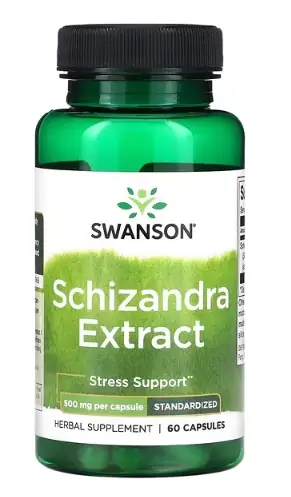
- 500 mg per capsule
- 60 capsules: enough for 30 days of use
Can I Use Several Adaptogens Together?
Such popular adaptogens as ashwagandha and Rhodiola rosea are usually well-tolerated and have few side-effects. If you do not exceed the doses used in clinical studies, you can use a combination of ashwagandha, rhodiola, and schisandra. Benefits of these three remedies include better sleep and reduced stress.
What Schisandra Tea Should I Use?

When choosing schisandra berry tea, decide on a product that features whole dried berries of the plant. That way, you will be able to control the quality of what you are buying.
The berries should taste sour — and extremely flavorful. You should be able to recognize some peppery, bitter, and pungent notes as well. These berries are called wu wei zi — the fruit of five flavors — for good reason.
To make schisandra tea, add your dried berries (1 to 2 tbsp.) to 2 cups of boiling water, cover your saucepan with a lid, and let the water simmer for 15 to 20 minutes. Now strain your antioxidant tea: true connoisseurs drink it without any sweeteners.
You can also chew berries themselves: start with one or two per day and slowly work your way up.
Do not use low-cost teas that contain blends of numerous adaptogens, like mushrooms, cordyceps, and schisandra. Benefits of these products are doubtful as you don’t really know the actual quantities of the remedies you are buying.
Now you know what schisandra benefits have been confirmed by recent studies. Keep in mind that no herbal remedy or supplement can be called a magic bullet. Do your best to get enough sleep, have a balanced diet, and exercise regularly.